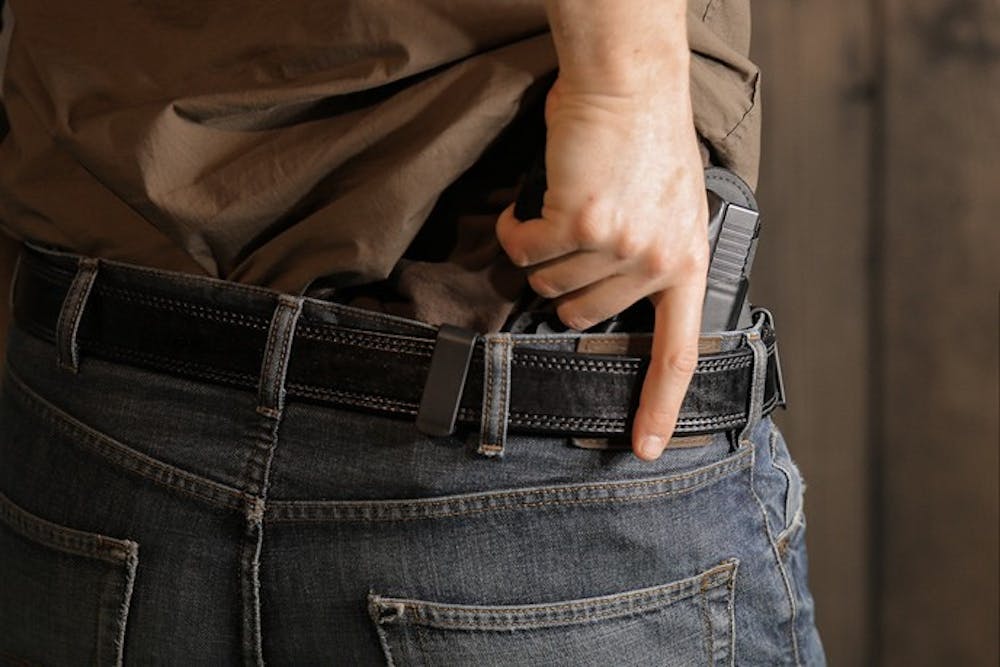
Many members of the Penn Law Community disagree with the idea that allowing guns on campus could help fight sexual assault.
Despite arguments that the allowance of guns on college campuses could help fight sexual assault, members of the Penn Law School community believe weapons on campus only encourage more violence.
This year, lawmakers in 10 states are pushing bills that would permit the carrying of firearms on campus. Currently, carrying concealed firearms on campus is banned by law or school policy in 41 states, and openly carrying weapons is usually forbidden as well. In Pennsylvania, guns on campus are not forbidden by state law, though most universities in the state have chosen to ban them. Advocates of the proposed legislation argue that “campus carry” — the ability to carry a concealed weapon on a college campus — would decrease instances of sexual assault.
“If you’ve got a person that’s raped because you wouldn’t let them carry a firearm to defend themselves, I think you’re responsible,” Rep. Dennis K. Baxley (R-Fla.) said in a House subcommittee debate, The New York Times reported.
But some say this misses the point. Susan Sorenson, a senior fellow in public health and an expert in violence prevention, said the theory that women can protect themselves from sexual assault by carrying firearms perpetuates the myth that rapes occur by an unknown perpetrator.
“Most sexual assaults, particularly on college campuses, occur between one person and someone else who she knows,” she said. “One’s reaction when you know someone is not necessarily to pull a gun on them.”
Penn’s official policy regarding the possession of dangerous weapons — including firearms, ammunition and explosives — states that faculty, students, staff, visitors and members of the University community may not possess or use any of these weapons in University buildings or on University property, regardless of whether they have a state license. Violators are subject to disciplinary action from the University and civil or criminal action under the discretion of Penn Police. Authorized Penn Police officers are exempt from the policy.
The Times reported that surveys indicate administrators, faculty and students generally oppose the idea of campus carry laws.
Sorenson said that the most frequent circumstances of sexual assault on college campuses are not compatible with armed self-defense. “It doesn’t jive with reality,” Sorenson said. “You certainly would not be likely to have a gun handy at a fraternity party, and if you are, that’s not necessarily a good idea because there is a lot of drinking going on.”
A report on alcohol and sexual assault published by the National Institute on Alcohol Abuse and Alcoholism says that approximately one half of all cases of sexual assault involve alcohol consumption by the perpetrator, victim or both. Lowered inhibitions and impaired judgement due to alcohol consumption increase the risk of sexual assault, as well as the danger of accidental shootings.
“In circumstances that come in every day — going to class or going out — people get shot accidentally all the time,” said Penn Law professor Kermit Roosevelt, who specializes in Second Amendment law. “The number of fights that turn into accidental shootings is going to overwhelm any safety benefit that you get.”
Roosevelt instead credits national campus carry support to National Rifle Association lobbyists in Washington. “There’s a very well-organized and powerful political lobbyist at work here — the NRA,” he said. “This is an issue that, nationally, people feel passionate about.”
The Daily Pennsylvanian is an independent, student-run newspaper. Please consider making a donation to support the coverage that shapes the University. Your generosity ensures a future of strong journalism at Penn.
DonatePlease note All comments are eligible for publication in The Daily Pennsylvanian.








